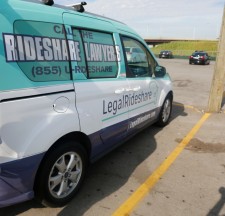
CHICAGO, October 13, 2018 (Newswire.com) - It’s 7 A.M. at Chicago O’Hare International Airport. Attorney Bryant Greening pulls his brightly colored, fully-wrapped “Law-Mobile” into the airport’s rideshare staging lot, where Uber and Lyft drivers are relegated to wait for fares. As the sun peeks over the horizon, there’s a noticeable tension in the air. The drivers look exhausted, annoyed, and defeated – sometimes waiting more than an hour for a ride request. Greening wastes no time popping his truck, only to reveal cases of coffee and doughnuts. Within seconds, drivers rush the car for a free pick-me-up. That’s when Greening’s work begins.
In late 2015, Greening co-founded LegalRideshare, a law firm entirely dedicated to Uber and Lyft accidents, injuries, and legal disputes. A personal injury attorney by trade, Greening was getting messages from tourists and business travelers who had been injured in rideshare cars. At that time, Uber and Lyft were elbowing their way into midwest cities and forever changing how we get to and from the airport (and everywhere else, for that matter). City governments, insurance companies, and the legal community, Greening observed, were lagging behind the fast-paced Silicon Valley companies. Riders and drivers were vulnerable as a result.
I knew Uber and Lyft's rapid expansion would lead to difficulties for passengers and drivers. What I didn't expect was the companies' unwillingness to provide useful information and recourse.
Bryant Greening, Co-Founder, LegalRideshare
Consider the Pennsylvania businessman whose Uber was rear-ended en route to the airport. He missed his flight, spent an evening in the emergency room, and almost lost a business deal as a result. LegalRideshare stepped in to fight for the damages. There was the Lyft driver who got T-boned on her way to pick up a frequent flyer from baggage claim and the Uber car that got robbed at gunpoint near Midway International Airport. Since inception, LegalRideshare has been helping frequent flyers – and drivers – after trips gone wrong.
Double back to airport staging lot, where Greening is pouring coffee and serving pastries. Innocuous chit chat quickly transitions to legal consultations. “Uber’s telling me they won’t pay to fix my dented passenger-side door,” one driver discloses. Greening’s arms uncross, and he becomes animated, explaining how to open a property damage claim and sift through insurance policies. “I ran a red light; is my passenger going to sue me for her medical bills?” a man questions. Greening pulls a business card from his jacket as he explains the ins-and-outs of negligence law, liability insurance, and rideshare regulations. Close your eyes, and it's easy to imagine the rideshare staging lot has transformed into a legal library.
“I knew Uber and Lyft’s rapid expansion would lead to difficulties for passengers and drivers. What I didn’t expect was the companies’ unwillingness to provide useful information and recourse,” Greening said. "That’s why LegalRideshare was born: to be a voice for passengers and drivers when they had nowhere else to turn."
After providing hours of airport consultations, Greening’s yellow legal pad is littered with potential clients’ names, email addresses, and police reports tucked under the pages. It’s tangible evidence of how many people are touched by Uber and Lyft’s stronghold on urban transportation. It’s also evidence of how many people need help navigating the emerging market. “Uber and Lyft have changed the way we get from points A to B.,” Greening said. “LegalRideshare makes sure they don’t disrupt the ways riders and drivers are protected.”
Source: LegalRideshare
Share:
